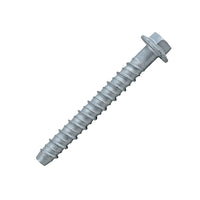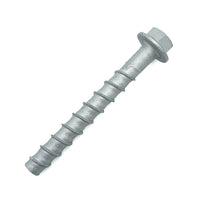Getting The Best Concrete Screw Anchor For Your Needs
Before choosing the best concrete anchor screws for your project, consider the following factors to ensure it meets your needs
Material
Because of their use case, screwbolts must be made from strong, durable materials to be effective, perform well, and be durable. Our stock of screwbolts is all built from strong, durable materials to be reliable in their use case. Carbon steel screwbolts provide higher strength and are suitable for most general applications. Stainless steel screwbolts provide excellent corrosion resistance, making them ideal for outdoor or marine environments.
Thread Design
The “self-tapping” thread design of screwbolts allows them to cut into concrete or masonry materials without the need for anchors or plugs. This feature simplifies the installation process while maintaining a secure hold. Look for threads specifically designed to handle the hardness of your base material, such as bolts for concrete and bolts for brick.
Load Capacity
Choosing a fixing with the right load capacity is essential for supporting the fixture's weight. We provide load ratings with each of our different sizes and types of screwbolts in different base materials, so be sure to choose an anchor with a higher load capacity than your project's requirements.
Base Material
What kind of base material are you installing your screwbolt into? Different screwbolts are designed for use in different materials like concrete, brick or masonry, so make sure the screwbolt you choose is compatible with the base material!
Head Type
The type of head you choose will affect both the installation process and the final appearance of the fixing. Hex heads, for example, offer easy installation with standard (non-specialised) tools, pan heads provide a broader grip, and countersunk heads offer a flush finish. Choose the head type that best suits your application requirements.





